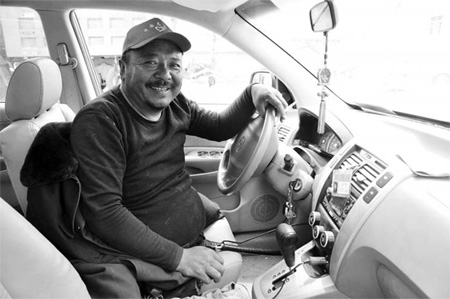'People still remember us; that's enough'
 |
|
Police officer Tseten Dorje, who lost his legs on duty, sits in his Jeep with modifications that allow him to drive only with his hands. Huang Shubo / Xinhua |
Police officer Tseten Dorje was included in the list of people to be honored for bravery during the rescue efforts in the wake of the 7.1-magnitude quake that hit Yushu of Qinghai province on April 14.
However, the 48-year-old officer from the Yushu county police station didn't walk onto the stage to receive his award from the central government on Thursday morning during the ceremony in Xining, capital of Qinghai province.
Tseten sat through the ceremony among nearly 1,000 people in the audience due to his physical handicap - he lost both his legs as a result of police work in 2007.
"People still remember us; that's enough," the policeman, who belongs to the Tibetan ethnic group, said to China Daily about his award.
Another 225 collective award winners (those who won awards as a group) and 334 individuals, including four who died in their heroic rescue efforts, also received awards. Wong Fu-wing, a Hong Kong driver who was crushed under collapsed houses after pulling four people out of the debris, was one among the four who received posthumous awards for bravery.
Despite his handicap, Tseten managed to transport more than 1,000 injured people to local hospitals in a modified Jeep featuring a hand crank to control the accelerator and the brakes.
"Even without legs, I'm still a policeman who should reach out to people in emergencies," Tseten said.
A seasoned officer and merit-winner with 25 years of experience, Tseten has been a "man of iron" who frequently took part in difficult missions.
Tseten was injured when he was chasing a suspect in 2007, and accidentally fell into a ditch on the rough Qinghai-Tibetan Plateau. His legs were seriously injured, but he didn't stop to get treatment until the mission was over six days later.
The injury had a relapse in early 2008 when a severe snow disaster hit the county. Tseten lost consciousness during a mission to dispatch disaster relief to the nearby city of Golmud.
In the hospital, he was told that his necrotic legs needed to be amputated. In his deepest despair, Tseten considered suicide.
"How could a policeman be without legs?" Tseten asked.
But after the surgery, with encouragement from family members and friends, he decided to start anew. One month before the earthquake, his sister bought him the Jeep with modifications that allow him to drive only with his hands.
When the quake hit Yushu, Tseten was among the first to be rescued. He had hardly recovered from bruises and other injuries when he asked his son to put him inside the Jeep.
The first person Tseten took to the hospital was a seriously injured woman who was still closely holding her dead baby when Tseten found her. She died beside him on the way to the hospital.
"I felt so helpless. I wish I could run on legs," Tseten said.
However, thanks to his timely transports, he helped save hundreds of lives soon after the quake, which claimed at least 2,698 lives and injured 12,000.
Four months after the quake, Tseten returned to his original position at the police station.
His voluntary efforts have continued. He often drove his Jeep every two days fetching tap water for his neighbors from 5 kilometers away.
"We have a river near our neighborhood, but we use its water only to flush the toilet for fear of possible infection," Tseten said, adding that he hopes that local residents can have tap water in the near future.
"Life has gradually returned to normal in Yushu. But it takes time for a full recovery," he says.
 0
0 







Go to Forum >>0 Comments